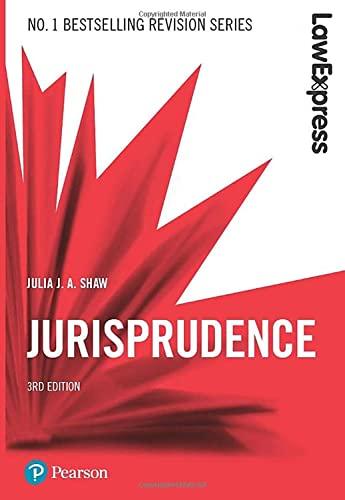Question
411-Ouch (45 points) Plaintiff is Ouch Pain Referral Service, LLC (411-Ouch), a medical referral business for car accident victims; They filed acomplaint, alleging that Illinois'
411-Ouch (45 points)
Plaintiff is Ouch Pain Referral Service, LLC ("411-Ouch"), a medical referral business for car accident victims; They filed acomplaint, alleging that Illinois' No-Fault Automobile Insurance Act,violates the First Amendment.
411-Ouch is incorporated in Florida and promotes itself in several states by billboards, radio, television, print, and the internet. When people call 411-Ouch, they are connected to an operator who refers them to health care providerslocated in the caller's geographic area.
Defendants are the members of the Illinois Board of Health (the "Board"). The Defendants have authority under Illinois' No-Fault Automobile Insurance Act,to discipline health care providers.
411-Ouch's radio and television advertisements that reference potential benefits available under the No-Fault Act are the subject of this lawsuit. The Act requires insurers to provide basic economic loss benefits to their insureds, regardless of fault. Specifically, the Act mandates coverage of up to $20,000 for medical expense loss and up to $20,000 for lost income, replacement service loss, funeral loss, survivor's economicloss, and survivor's replacement services loss.
To curtail potentially unethical practices the Act includes restrictions on the advertisement of medical services to car accident victims.It reads in relevant part as follows:
Any solicitation or advertisement for medical treatment, or for referral for medical treatment, of an injury eligible for treatment under [the No-Fault Act] must:
1. be undertaken only by or at the direction of a health care provider;
2. prominently display or reference the legal name of the health care provider;
3. display or reference the license type of the health care provider, or in the case of a health care provider that is a business entity, the license type of all of the owners of the health care provider but need not include the names of the owners;
4. not contain any false, deceptive, or misleading information, or misrepresent the services to be provided;
5. not include any reference to the dollar amounts of the potential benefits under [the No-Fault Act]; and
6. not imply endorsement by any law enforcement personnel or agency.
Plaintiffs allege that the law violates Plaintiffs'speechrights. For example, 411-Ouch's radio ads inform accident victims that they "may be entitled to up to forty thousand dollars in injury and lost wage benefits."Plaintiffs advertisements also do not disclose the legal names or license types of the health care providers in 411-Ouch's referral network.
Further, television advertisements feature a vehicle crash and then an actor appearing as a police officer or EMT with an ambulance conveying to viewers that if they call the phone number for 411-Ouch or go to411Ouch.com, then they can get help after being injured in an accident." The TV spots "contain a conspicuous and prominent disclaimer stating that the personappearing in the advertisement is a 'PAID ACTOR.'
Plaintiffs argue that the law violates their First Amendment rights by creating an unconstitutional "blanket ban" on 411-Ouch'sspeech rightsand creates a de facto ban on 411-Ouch's ability to advertise in Illinois. Fully discuss how the court should rule.
Step by Step Solution
There are 3 Steps involved in it
Step: 1

Get Instant Access to Expert-Tailored Solutions
See step-by-step solutions with expert insights and AI powered tools for academic success
Step: 2

Step: 3

Ace Your Homework with AI
Get the answers you need in no time with our AI-driven, step-by-step assistance
Get Started


